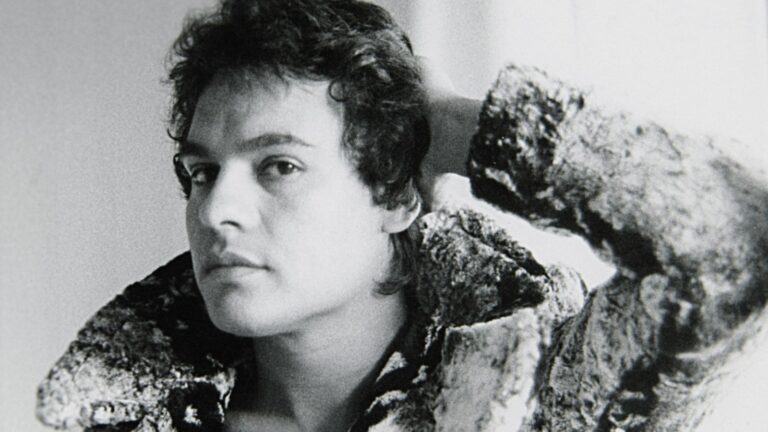Last year, Mexican singer-songwriter Silvana Estrada was working on the follow-up to her critically acclaimed 2022 debut album, Marchita. But midway through the process, she hit a wall. It wasn’t that she couldn’t write anymore. She didn’t want to.
The success of Marchita brought the kind of opportunities that Estrada — the daughter of luthiers from the verdant hills of Coatepec, Veracruz — had dreamed of just a few years earlier. She was touring the world, opening for artists like Andrew Bird and Iron & Wine, and she had been nominated for awards at the Latin Grammys, walking away with Best New Artist that fall.
But the year also came with the kind of struggles she never could’ve imagined. First, she had to deal with a spinal cord injury brought on by exhaustion. Then, she received news that her best friend and his brother had been abducted and murdered in Mexico City. While the singer had always turned to music to process her emotions, in the months and the year following her friend’s death, it often felt futile. “I just thought, ‘There’s no song that can bring him back,’” she tells Rolling Stone.
It was the spirit of the legendary Costa Rican-Mexican singer Chavela Vargas that delivered her from the edge.
In February, Estrada had accompanied a friend to an artist residency at Vargas’ former home in the valley of Tepoztlán, south of Mexico City. She made it clear that she wasn’t there to make anything and mostly spent her days lazing by the pool. But eventually, she picked up her guitar and a kind of magic happened. “Within minutes, I was singing a whole song,” she says. “Subconsciously, it was like I had asked Chavela for help, and then I was crying, my friend was crying, there were goosebumps everywhere.”
The song, “Un Rayo De Luz,” is arresting — the feeling of the first warm rays of spring after a harsh winter. Set first to a sparse guitar, Estrada’s silvery voice soars over a sweeping string arrangement. Just two days before writing it, Estrada had seen an interview with Vargas where she reflected on death saying, “How beautiful it must be that no one has ever come back from it.”
“That image made me so happy,” says Estrada. “Just the idea that my friend wouldn’t be coming back because he’s somewhere in paradise. It was beautiful.”
The song brought things back into focus, allowing her to thread the emotions that had been weighing on her into the beautiful, soul-baring poetry of Vendrán Suaves Lluvias (Soft Rains Will Come), out Oct. 17.
The album is a triumphant release that balances anger and grief and, at times, surprising joy, with Estrada’s bright, lilting soprano piercing through the veil of her pain. “I had so many things to say, but so much to process,” she says. “It took three years for me to reconnect with myself, with light and happiness, and allow myself to say, ‘I don’t know what I want, or where this journey is going to take me, but I just want to be present.’”
Out poured songs like the exhilarating, “Dime,” in which Estrada channels her frustrations over a failing relationship into an emboldened demand: “Tell me if you’re leaving or if you’re staying / Tell me if this time it’s for real,” she sings in Spanish. On “Good Luck, Good Night,” she embodies the melodrama of Juan Gabriel’s “Hasta Que Te Conocí,” writing her own scorned send-off to a disappointing lover.
Moments on the album — the pensive, delicate beauty of “Como un Pájaro” and “Flores,” or the joyful nostalgia of “Lila Alelí” — evoke the same bittersweet tenderness that marked Marchita. But with Vendrán Suaves Lluvias, Estrada is bolder, wilder, more instinctual.
Writing this album, she says, was an exercise in confronting her anger and learning to wield it instead of trying to package it up. “I think it’s difficult for women to even acknowledge their anger sometimes,” she says. “Since the pinche Greeks with the furies, an angry woman is an ugly woman. It feels like the right to be angry has almost been taken from us, and yet there’s so much for us to be angry about.”
Owning her anger gave her a greater sense of agency and self-determination. When she started looking for producers for the album, they either had notes on her vision or didn’t quite get what she wanted, Estrada decided to produce it herself.
“I was so lost I couldn’t deal with having someone between me and the music,” she says. “I really believed in my vision, so it was a moment of empowerment, but also a lot of hesitation, and a lot of insecurity.”
Estrada threw herself into the process, directing a band of seasoned musicians, giving orders to arrangers and engineers, all mostly men. For the 28-year-old, it was a massive adjustment. “It was scary, but I needed to do it not only for myself, but for other female artists and producers,” she says.
In the end, Vendrán Suaves Lluvias was recorded in three different countries and five different studios. And while you wouldn’t know it from listening to it, most of the vocals on the album are from Estrada’s demo recordings. It was a three-year journey, but one full of discoveries and happy accidents made in the process of learning to trust herself and enjoy making music again.
“I was just having fun, and I think that’s what I’m proudest of,” she says. “I got to produce this album and be me. Especially being a Latina, I think the whole world doubts us so much that sometimes I think we forget to enjoy ourselves. We forget why we do what we do.”
A huge reference for Estrada was Joni Mitchell’s Blue. It wasn’t just the raw emotion of the seminal album, but the feeling that Mitchell was plucking her guitar and pouring her heart out just a few feet away. Like Mitchell, Estrada has a knack for softening the sharp edges of our emotions and finding beauty in our ugly truths.
“Joni creates a mirror where you see the real you, but it’s so covered in beauty that you feel safe to reconcile with yourself,” she says. “With this album, I’m trying to reconcile these feelings of anger and pain, but I try my best to cover them with beauty so I can start to love them, too. I want to love my anger, I want to love my grief, I want to love my pain, because it’s who I am, it’s part of me. I have to accept it, I have to give myself grace.”



